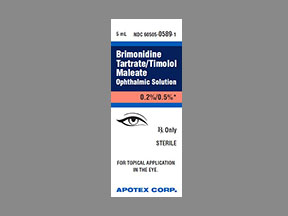
Brimonidine-timolol Coupons & Savings Card – Discount Prices from $37.18
Generic for: Combigan
My prescription
Edit
10ML of 0.2-0.5%, Brimonidine-timolol (1 Bottle)
Select pharmacy

CVS
$37.18
COUPON PRICE
Albertsons
$49.10
COUPON PRICE
Walgreens
$60.60
COUPON PRICE
Walmart
$162.91
COUPON PRICEBrimonidine-timolol savings card
Show this card to your pharmacist
CVS
$37.18
BIN
ID
PCN
GRP
019876
LH0C8F7189
CHIPPO
LHX
Powered by
More prescriptions for glaucoma
More prescriptions for glaucoma
Price history for Combigan (brand) & Brimonidine-timolol (generic)
1 Bottle, 10ML of 0.2-0.5%
Average retail price for Combigan
Average retail price for Brimonidine-timolol
Average SaveHealth price for Brimonidine-timolol
Our price history data is based on aggregated prescription data collected from participating pharmacies in America. Our prescription data updates daily to reflect the latest price changes. If you notice a missing data point, it means there wasn't sufficient data available to generate a monetary value for that date.
We analyzed Brimonidine-timolol prices for (10ML of 0.2-0.5%, 1 Bottle) over the last 12 months. The average retail price was $177.13, while the average price using the SaveHealth discount card was $95.33. That's a savings of approximately 46.18% when using our Brimonidine-timolol coupon.
Compared to the generic version, Combigan had an average price of $493.31 over the same time period. With the SaveHealth savings card, Brimonidine-timolol is 80.68% cheaper on average than Combigan.
*Retail prices are based on pharmacy claims data, and may not be accurate when we don't have enough claims.
Brimonidine-timolol dosage forms
Dosage Quantity Price from Per unit 10ML of 0.2-0.5% 1 Bottle $37.18 $37.18 10ML of 0.2-0.5% 2 Bottles $48.06 $24.03 10ML of 0.2-0.5% 3 Bottles $58.93 $19.64
| Dosage | Quantity | Price from | Per unit |
|---|---|---|---|
| 10ML of 0.2-0.5% | 1 Bottle | $37.18 | $37.18 |
| 10ML of 0.2-0.5% | 2 Bottles | $48.06 | $24.03 |
| 10ML of 0.2-0.5% | 3 Bottles | $58.93 | $19.64 |
